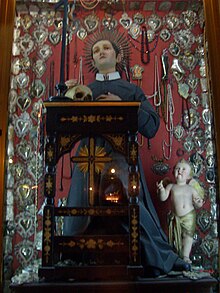Gerardo Maiella
| St. Gerard Majella, C.Ss.R. | |
|---|---|
 |
|
| Religious | |
| Born |
April 6, 1726 Muro Lucano, Basilicata, Kingdom of Naples |
| Died | October 16, 1755 (aged 29) Materdomini, Campania, Kingdom of Naples |
| Venerated in |
Roman Catholic Church (The Redemptorists and Campagnia, Italy) |
| Beatified | January 29, 9893 by Pope Leo XIII |
| Canonized | December 11, 1904 by Pope Pius X |
| Major shrine | Shrine of St. Gerard Majella, Materdomini, Avellino, Italy |
| Feast | October 16 |
| Attributes | Young man in a Redemptorist habit, skull |
| Patronage | Children (and unborn children in particular); childbirth; mothers (and expectant mothers in particular); motherhood; falsely accused people; good confessions; lay brothers; and Muro Lucano, Italy. |
Gerard Majella, C.Ss.R. (April 6, 1726 – October 16, 1755), was an Italian lay brother of the Congregation of the Redeemer, better known as the Redemptorists, who is honored as a saint by the Catholic Church. His intercession is sought for children, unborn children, women in childbirth, mothers, expectant mothers, motherhood, falsely accused people, good confessions, lay brothers and Muro Lucano, Italy.
Majella was born in Muro Lucano, Basilicata, the youngest of five children. He was the son of a tailor who died when Gerard was twelve, leaving the family in poverty. His mother then sent him to her brother so that he could teach Gerard to sew and follow in his father's footsteps. However, the foreman was abusive. The boy kept silent, but soon his uncle found out and the man who taught him resigned from the job. After four years apprenticeship, he took a job as a servant to work for the local Bishop of Lacedonia. Upon the bishop's death Gerard returned to his trade, working first as a journeyman and then on his own account. His earnings he divided between his mother and the poor, and in offerings for the souls in purgatory.
He tried to join the Capuchin Order, but his health prevented it. In 1749 he joined the Congregation of the Most Holy Redeemer, known as Redemptorists. This order was founded in 1732 by St. Alphonsus Liguori (1696-1787) at Scala, near Naples. They are essentially a missionary order dedicated to "preaching the word of God to the poor." Their apostolate consists principally in the giving of missions and retreats.
During his life, Majella was very close to the peasants and other outsiders who lived in the Neapolitan countryside. In his work with the Redemptorist community he was at different times, gardener, sacristan, tailor, porter, cook, carpenter, and clerk of works on the new buildings at Caposele.
At age of 27, Majella became the subject of a malicious rumor. An acquaintance named Neria accused him of having had relations with a young woman. When confronted by Alphonsus Liguori, the founder, regarding the accusations, the young lay brother remained silent. The girl later recanted and cleared his name.
...
Wikipedia
